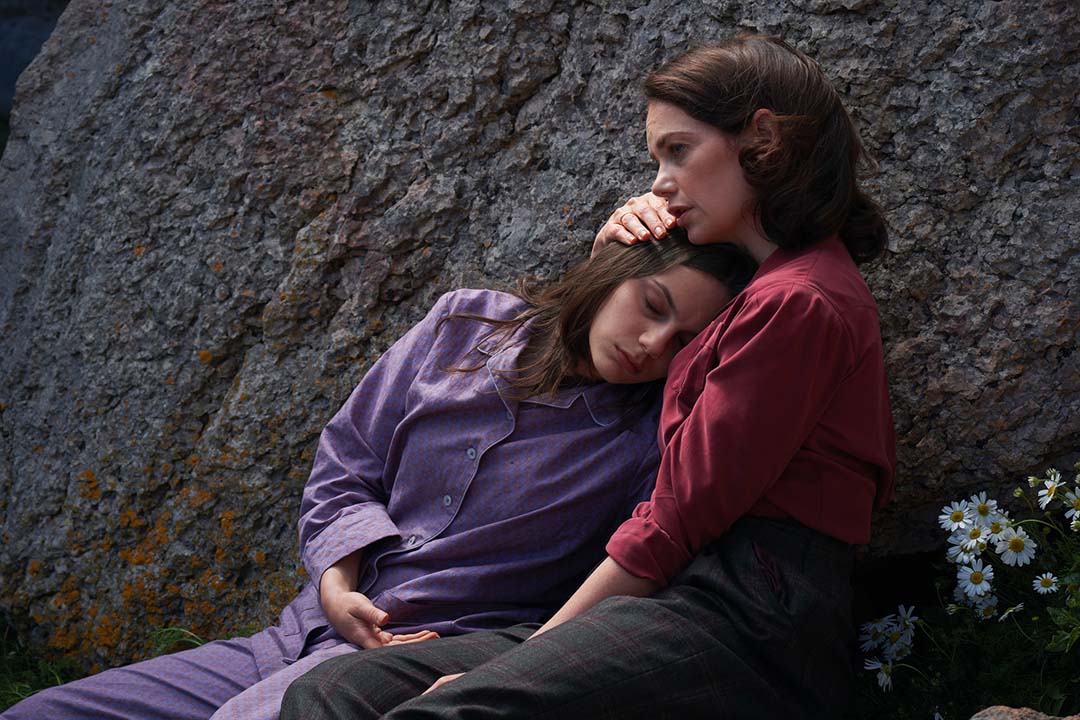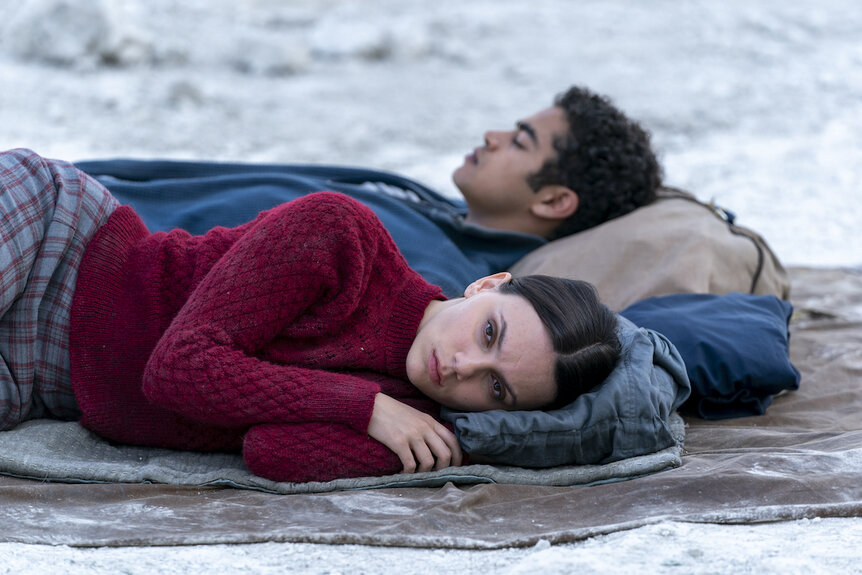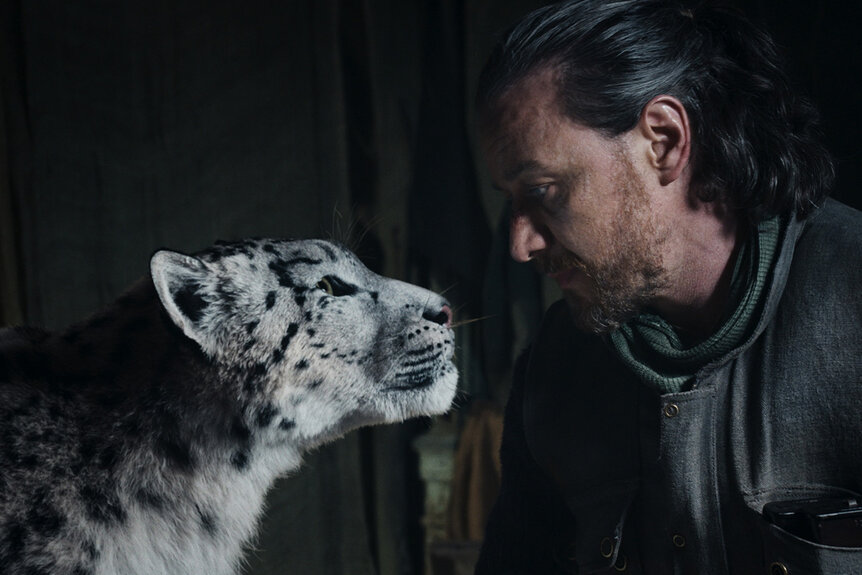Create a free profile to get unlimited access to exclusive videos, sweepstakes, and more!
The ‘His Dark Materials’ bosses talk S3 challenges and the coming of the park bench
“You should be scared," Jane Tranter says of the final season of the HBO show.

Season 3 of His Dark Materials is upon us, and fans of the famous book series by Philip Pullman may be getting a little nervous. The televised adaptation is finally going into the insane journey that is the final installment, The Amber Spyglass, where the three-book journey of Lyra Belacqua (Dafne Keen) comes to an end. She appears in Pullman’s new trilogy, The Book of Dust, but that is another matter entirely.
Why would fans be nervous? It’s not because they're worried that some of their favorite parts of the book will be left out. Angels, Mulefa, and the tiny Gallivespians are all going to be on display. Lyra, Will (Amir Wilson), Mrs. Coulter (Ruth Wilson), and Lord Asriel (James McAvoy) will all have their day in the sun.
Simply put, two words will usually break the heart of any fan of The Amber Spyglass and make them both nervous and scared. Those two words: park bench. We won't spoil what this means if you’re experiencing the story on television for the first time — just have tissues and a surgeon at the ready.
Jane Tranter has been working to build the kingdom of this show for all three seasons, and SYFY WIRE recently caught up with both her and executive producer Dan McCulloch. What were the big challenges for Season 3? What makes this particular fantasy series stand out? Should we be afraid of the park bench? Tranter and McCulloch did not hold back.
The Amber Spyglass is huge. What was the biggest challenge in bringing this incredibly crazy book to life?
McCulloch: I think by the time we get to Season 3, the actors knew who their characters were, they knew where they could push themselves, they had that ambition that they wanted to go further than they've ever been before. We had to service that ambition. We had to give them the worlds that they would be journeying through, and make them convincing and make them believable. There was just new world after new world, and that took real stamina.
I think in some ways, the most intellectually complex element was probably the creation of the Gallivespians. That was certainly a huge challenge, you don't do small people easily. There is a reason why it's not often tackled, it can be quite cheesy and strange, and that was a new place for the His Dark Materials team to go, and that was a deep dive in research in prior stories and looking back in cinema as far back as King Kong to see how it works, small people and big people.
Tranter: I think there's one other thing, I'm just going to say really quickly that just occurring to me, that I think it's also about making the right kind of noise with the third season, and that right kind of noise that both is completing the journey that we've taken everyone on so far, with making sure we land the answers to all the questions, often some quite complicated, crunchy questions, that we kept asking within the drama as we've gone along. For example, what is Dust? Is it good, is it bad? But many more than that. But making sure we do that and we completed the show, but also making sure that we land season three in such a way that we can start new audiences on Season 1, and work their way through again.
We hoped to get angels, Mulefa, and Gallivespians, and we’re getting all of them. It sounds like that's not what it’s really about, though. Yes, all of the fantasy elements are great, but let's nail Lyra's journey first?
Tranter: Completely, completely. Ultimately, it's all about Lyra. The first word and the last word of the books in the His Dark Materials trilogy are “Lyra”, it's all about her journey. You had to use that as a sort of divining rod, in a way. And for us, the biggest challenge always was when we get to that park bench, how is an audience going to feel? And will the audience feel as intensely full of love and loss and, weirdly, hope, in the ending that we present to them in our television adaptation as the reader does at the end of those books? And that really is the ultimate challenge. The rest is good stuff, for sure, but how do we make an audience feel?
RELATED: Dafne Keen and Amir Wilson on their journey in His Dark Materials Season 3 and love conquering all
We’re both excited and scared about the park bench.
Tranter: Yeah, you should be. You should be scared.
McCulloch: I think right from the very beginning, when Francesca Gardiner first wrote the end on that last episode, I think she literally short-circuited her own laptop from the tears that went down through the keys into the circuit board, under the computer. And then ever since then, we've been working and working at it and adding the layers from Dafne [Keen], who I spoke to recently, just last week, and said, "The music's on now. The music's there, it's all just there and it's all firing." And it's hand over your mouth.
Tranter: It really is.
Lorne Balfe, the composer, is going to kill us with that score isn't he?
Tranter: Yeah, he is. Yep, yep.
There's been a lot of fantasy on TV this year — the last few months in particular. There’s been about four shows on at once, all the time, and we're not done. How would you both say that His Dark Materials differentiates itself from, say, House of the Dragon, or The Rings of Power, or even The Sandman?
Tranter: I don't think His Dark Materials even enters the same quadrant as those shows. Partly through genre, which we can talk about, and partly through budget, which we can talk about, and partly through it being a show that families can watch. It's totally different. Yes, it's got fantasy in it, but it's not apples to apples. It's not like comparing House of the Dragon with Game of Thrones; The Rings of Power with The Lord of the Rings, where they're all roughly in the sort of the same thing. This is completely different.
McCulloch: The books are over 30 years old. I think they were the first of their kind to feature a child in a different world, different to our own, and yet take the stories if it's not just for children. It’s for everyone. And I think we've seen the benefits of that across the world of fantasy, across the world of science fiction. But the books still remain the same. They still remain defining story or defining odyssey that is unlike any other. There's no other Lyra, there's no other Will, there's no other Coulter, and certainly no other Asriel. So I think the viewing experience is exceptional, simply because it was so original.
Tranter: And it's not all about power. If it was going to enter the arena with those other shows, it would be all about Coulter and Asriel, and all about their search for power, and the need for greatness and the need for legacy. And it's not, it's about two children who are allowed to be children. It's not even like Harry Potter, where the children actually behave like adults and make adult choices. They don't, they make children's choices, they're allowed to be children. As [series writer and executive producer] Jack Thorne would say, it makes it about goodness versus greatness.
Its themes are bigger. What does it mean to be human? What is the nature of our human consciousness? And you do all of that, but within an entertaining, dramatic structure. So I think it's more thought-provoking. I think it's much less spectacular, in terms of its budget it is significantly smaller. But then, on the other hand, we always say that our budget's right for us. We don't want loads and loads of battles. Our budget is spent on character. Our budget is spent on the creation of those daemons. Our budget is spent on making sure that the actors have got the best possible worlds in order to act in... it's about text and performance.
It's a different thing, and I think very unusual for American television, in terms of it's proper four quadrants of an audience, and therefore I think it can get easily overlooked, because it's not a big, adult, noisy battle of a show. It's something that you can watch with the family. It's not so glamorous from that point of view, but it's utterly its own piece. Even the fact that we were allowed to make a trilogy as a trilogy, we didn't have to extend it to more seasons? It's just utterly of itself.
Season 3 of His Dark Materials begins on HBO Max on Dec. 5, 2022. This interview was edited for length and clarity.
Looking for more fantasy? Stream tons of great titles on Peacock.





























